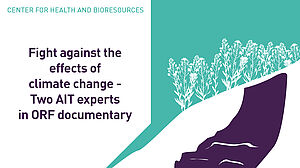Climate change has long had a noticeable impact on the everyday lives of many people in Austria. The new documentary "Unser Wetter: Zwischen Dürre und Flut" (Our Weather: Between Drought and Flood) of the ORF initiative "MUTTER ERDE: Klima und Ernährung" (Mother Earth: Climate and Food) is now available online for seven days. The documentary provides insights into the stories of people whose lives are directly affected by weather changes and the challenges they pose. Two AIT experts, Claudia Jonak, Competence Unit Bioresources at the AIT Center for Health and Bioresources, and Philip Leopold, Competence Unit Transportation Infrastructure Technologies at the AIT Center for Low-Emission Transport, answer questions from weather expert Andreas Jäger about heat- and drought-resistant plants and landslides in connection with climate change.
UNTWIST - Learning from gold of pleasure for climate resilience
Claudia Jonak is leading the UNTWIST project to help European agriculture meet the challenges of climate change. Experiments with more than 50 genetically different gold-of-pleasure varieties under simulated stress are yielding important insights for climate-resistant cropping systems. Jonak and her team are developing coping strategies and crop prediction models. These include genetic information, physiological and phenotypic differences as well as agronomically relevant parameters.
Climate change leads to more frequent landslides
Philip Leopold is a technical geologist and expert on landslides and their impact on infrastructure. Together with an interdisciplinary research group, Leopold has found that global warming significantly increases the risk of landslides. A temperature increase of four degrees could increase the risk by 45 per cent. The research involves studying various factors such as rainfall intensity, soil moisture and land use to gain a better understanding of how landslides occur.
Our weather: Between drought and flood
In the Weinviertel region, Martina Fink harvests very small sugar beet and pumpkins in 2022; the rain at the right time of the growing season was missing. In the Waldviertel near Heidenreichstein, the water level on Friedrich Hofbauer's carp ponds has dropped half a metre. Less water means less carp ergo less yield.
Even more dramatic, is the situation around Wiener Neustadt. The inhabitants of the surrounding lakes thought they were in paradise - now they live by a gravel pit. The water level has dropped 11 metres and swimming is no longer possible. The Schreiber tree nursery in Poysdorf tries to take advantage of the hot summers and extreme weather phases and cultivates exotic fruits.
Armin Mayer from Treffen in Carinthia reports on the devastating and destructive effect of too much water. Most of his agricultural land was flooded and the harvest ruined. What is the background to the freak weather? How does a mudflow occur? Why do earthworms hibernate in summer, and how do carp behave in summer?
Weather expert Andreas Jäger asks critical questions to experts, finds out the background and solutions.
Link to ORF-Streaming (DE): https://tv.orf.at/program/orf3/unserwette100.html
Plant Vigor: https://www.ait.ac.at/themen/improvement-of-plant-quality-vigor/plant-stress-tolerance-mechanisms



